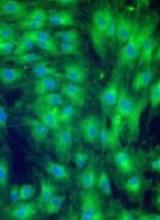The US Food and Drug Administration (FDA) has granted orphan drug designation to CYP-001 for the treatment of acute graft-versus-host disease (GVHD).
CYP-001 is a mesenchymal stem cell (MSC) product manufactured using Cynata Therapeutics Limited’s proprietary Cymerus™ technology.
According to Cynata, this technology enables economic manufacture of MSCs at commercial scale through the production of an MSC precursor called a mesenchymoangioblast (MCA).
The Cymerus MCA platform provides a source of MSCs that is independent of donor limitations and provides a potential “off-the-shelf” stem cell platform for therapeutic use, Cynata says.
The company recently released results from the first cohort of patients in its ongoing phase 1 trial of CYP-001 for the treatment of steroid-resistant acute GVHD.
The trial includes adults who received an allogeneic hematopoietic stem cell transplant to treat a hematologic disorder and were then diagnosed with steroid-resistant, grade 2-4 GVHD.
The first 8 patients were enrolled in cohort A, where they received 2 infusions of CYP-001 at a dose of 1 million cells/kg, up to a maximum dose of 100 million cells. There was 1 week between the 2 CYP-001 infusions in each patient.
For these 8 patients, overall survival at day 100 was 87.5%.
The overall response rate by day 100 was 100%, with all 8 patients showing an improvement in the severity of GVHD by at least 1 grade compared to baseline.
The complete response rate by day 100 was 50%, meaning GVHD signs/symptoms completely resolved in 4 of the 8 patients.
No treatment-related serious adverse events or safety concerns have been identified to date.
The next 8 patients will be enrolled in cohort B and receive 2 infusions of CYP-001 at a dose of 2 million cells/kg, up to a maximum dose of 200 million cells. Recruitment of these patients is progressing.
About orphan designation
The FDA grants orphan designation to products intended to treat, diagnose, or prevent diseases/disorders that affect fewer than 200,000 people in the US.
The designation provides incentives for sponsors to develop products for rare diseases. This may include tax credits toward the cost of clinical trials, prescription drug user fee waivers, and 7 years of market exclusivity if the product is approved.


